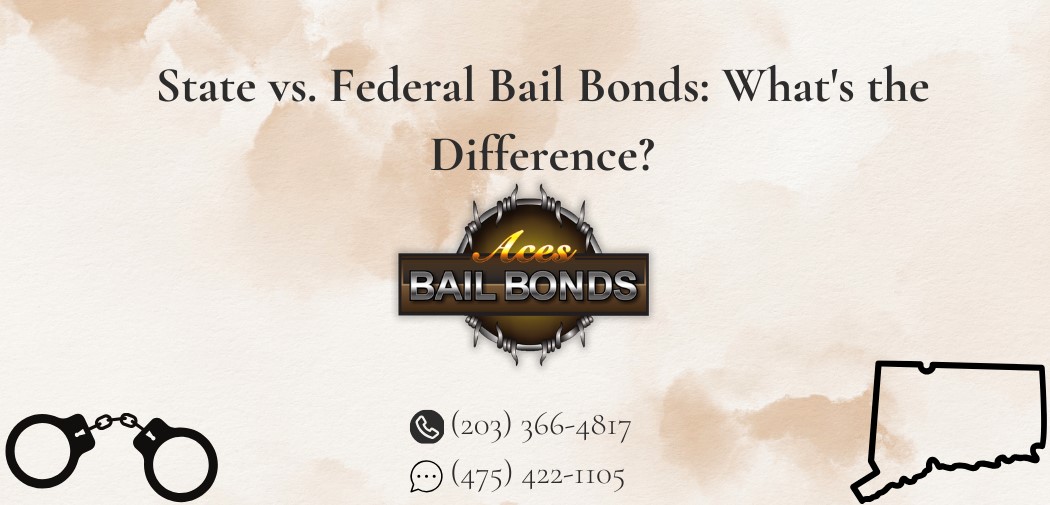State vs. Federal Bail Bonds: What’s the Difference?
When navigating the criminal justice system, one of the most important steps is understanding the bail bond process. Bail allows a defendant to secure release while awaiting trial, but the rules vary depending on whether the case is in state court or federal court.
Knowing the difference between state bail bonds and federal bail bonds is crucial for defendants and their families. This guide explains how each system works, from jurisdiction and bail amounts to conditions of release and the role of bail bond agents.
1. Jurisdictional Differences
-
State Bail Bonds – Used in cases that violate state law, such as assault, burglary, DUI, or drug charges prosecuted in state courts.
-
Federal Bail Bonds – Required when a case involves violations of federal law, such as drug trafficking across state lines, immigration violations, tax evasion, bank fraud, or crimes against federal officials.
2. Severity of Offenses
-
State Offenses – Range from misdemeanors to felonies. Penalties vary widely, from fines to prison time.
-
Federal Offenses – Typically more severe, involving organized crime, large-scale fraud, or national security concerns. Penalties are harsher, with longer sentences and heavier fines.
3. Bail Amounts
-
State Bail Bonds – Bail is usually based on a bail schedule or set by a judge. Amounts are generally lower, reflecting the nature of most state-level offenses.
-
Federal Bail Bonds – Bail is significantly higher. Federal judges may also require a Nebbia hearing to prove bail money comes from legitimate sources.
4. Conditions of Release
-
State Bail Bonds – Common conditions include travel restrictions, no-contact orders, or regular check-ins with a bail bondsman.
-
Federal Bail Bonds – Conditions are much stricter, often including electronic monitoring, surrendering passports, pretrial supervision, or even house arrest.
5. Role of Bail Bondsmen
-
State Bail Bondsmen – Widely available, charging a standard fee (typically 10%). They guide clients through the state bail process quickly and efficiently.
-
Federal Bail Bondsmen – Far fewer handle federal cases due to complexity. They must meet higher qualifications and may charge higher fees to manage the additional risks.
6. Nebbia Hearings
A key difference in state vs. federal bail bonds is the Nebbia hearing requirement.
-
State Cases – Rarely require a Nebbia hearing.
-
Federal Cases – Defendants must prove bail funds are from legal sources, adding another layer of scrutiny.
7. Refund Process
-
State Bail Bonds – Refunds are generally faster and simpler once the defendant meets all court requirements.
-
Federal Bail Bonds – Refunds take longer, with more legal review. Any violation of bail conditions may result in forfeiture.
8. Legal Representation
-
State Cases – Many criminal defense attorneys specialize in state bail hearings.
-
Federal Cases – Require attorneys experienced in federal bail law, Nebbia hearings, and stricter court procedures.
9. Appeals and Reviews
-
State Bail Appeals – Can be made to higher state courts and are often resolved quickly.
-
Federal Bail Appeals – More formal and time-consuming, involving federal appellate courts.
10. Impact on Defendants
-
State Bail Bonds – Easier to secure, with lower bail amounts and less stringent conditions.
-
Federal Bail Bonds – More difficult due to higher amounts, stricter monitoring, and complex procedures.
11. Public Perception
-
State Cases – Typically draw less media attention unless high-profile.
-
Federal Cases – Often heavily covered, especially in organized crime, fraud, or immigration matters, influencing stricter bail rulings.
12. Bail Reform Movements
-
State Bail Reform – Many states, including Connecticut, are reducing reliance on cash bail for low-level, non-violent offenses.
-
Federal Bail Reform – Focuses on fairness, transparency, and stricter oversight of the bail process.
Conclusion: Choosing the Right Bail Bond
Understanding the difference between state and federal bail bonds is critical.
-
State bail bonds are more straightforward, with lower bail amounts and simpler conditions.
-
Federal bail bonds involve higher stakes, Nebbia hearings, stricter release conditions, and longer refund timelines.
Whether facing state or federal charges, having the right bail bond services and experienced legal representation makes all the difference.
At Aces Bail Bonds, our knowledgeable team of Connecticut bail bond agents helps clients navigate both state and federal bail processes with professionalism and care. We provide fast, affordable bail bond services and guide families through the challenges of the justice system.

